Contents
For about 10 years, Marquette grapes have been cultivated in our country. The description of the variety, photos and reviews testify to its excellent technical qualities. The wines obtained from it have repeatedly occupied leading positions in tastings.
Marquette grapes were obtained by American breeders by crossing complex interspecific hybrids from well-known varieties, among which is the famous Pinot noir. The novelty was patented in 2005 and immediately appreciated in North America.
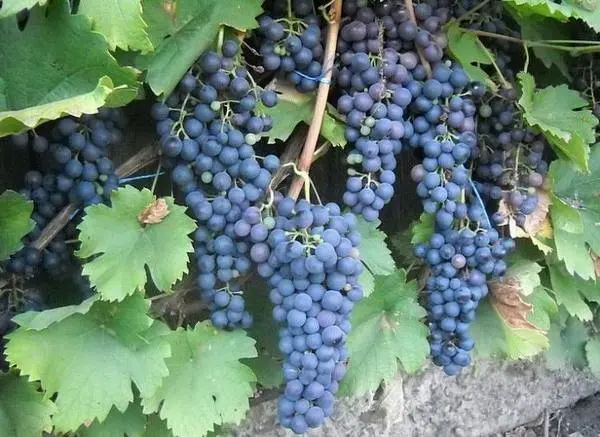
Characteristic of the variety
The average ripening of Marquette grapes, combined with its high frost resistance, makes the variety indispensable for growing in the northern and northwestern regions of the country. Vines in an uncovered form can successfully overwinter even at 38-degree frosts. However, after spring opening of the buds, the Marquette vine becomes defenseless against the cold and can easily die even from small frosts. The most susceptible to them are annual seedlings, the older the vineyard, the less he is afraid of the cold. Freezing rain is especially terrible for Marquette bushes, so in early spring, growers try to cover the shoots from moisture.
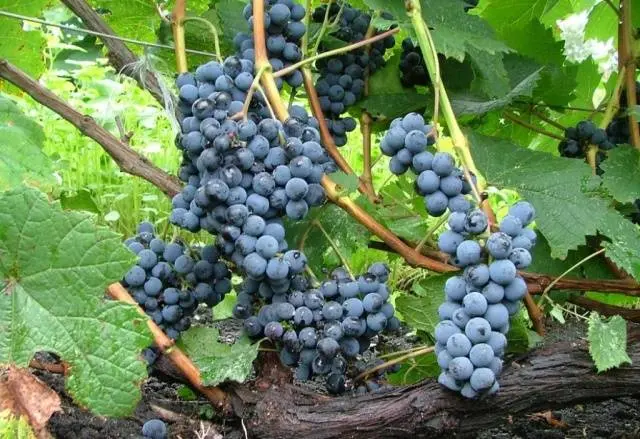
Marquette grapes belong to the technical varieties. Its small dense brushes are hung with small dark blue berries with a purple tint and a thin waxy coating. Variety Marquette is different:
- high sugar content – up to 26%;
- acidity above average, although it is not felt at all in fresh berries;
- high yield – up to 90-100 kg / ha;
- resistance to fungal diseases.
Thanks to the vertical growth of grape bushes, there is no need for their garter and illumination improves. Fruitful shoots of the Marquette variety give up to two brushes weighing up to 100 g. Marquette grapes performed well in the climatic conditions of the Moscow region.
Features of landing
Marquette grapes are easily propagated using seedlings or cuttings. You can plant it in spring and autumn. It is important to choose the right site for planting vines. The best place for the Marquette variety is the southern part of the garden with good lighting. An important factor influencing the choice of site is the depth of groundwater. Therefore, it is desirable to choose sites located on elevated places. The soil should be loose, with good throughput. Otherwise, you need to dig it up with compost. Grapes grow well on loam or sandstone. In the description of the variety, it is recommended that Marquette grapes be planted in a trench way. Landing technology is simple:
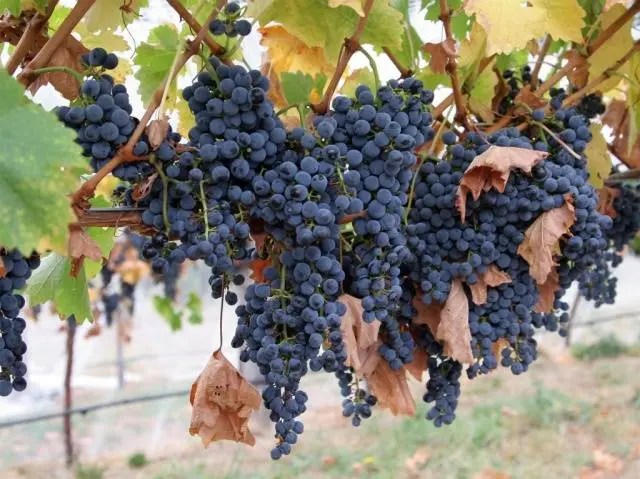
- it is necessary to dig a trench up to half a meter wide and up to 1 m deep;
- fill its bottom with a 20-centimeter layer of broken bricks;
- pour a mixture of fertile soil with sand on top;
- on the sides of the trench, put 4 half-meter plastic pipes for watering and fertilizing, so that their ends are above the ground;
- plant grape bushes, leaving a distance of 1 m between them;
- cover with earth up to the second eye of the seedling;
- water each bush of grapes abundantly;
- mulch the soil under plantings;
- to tie the vines, build a trellis along the trench with a stretched wire at a height of about 30 cm;
- pull two more rows of wire strings every 40 cm.
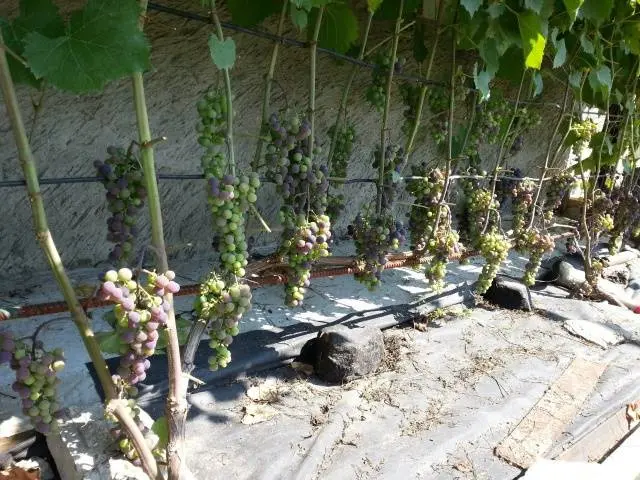 4
4
hardening grapes
Despite winter hardiness, in the first years after planting, expert reviews advise gradually accustoming Marquette grapes to cold weather, since young bushes are not yet very resistant to frost. Seedlings need to be hardened gradually, otherwise they will die very quickly. During the three-year period after planting, Marquette bushes should be insulated for the winter, as expected. To protect against unstable weather, it is better to lay the vine on boards and cover with snow.
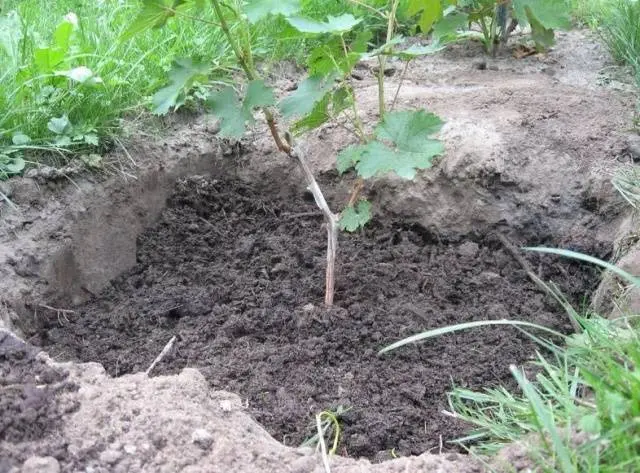
In subsequent years, the amount of covering material should be gradually reduced and Marquette grapes should be insulated at a later date. In the spring, you need to track the damage caused to the shoots by frost. This will allow you to adjust the thickness of the shelter next year. When the grape vine is quite strong, it can no longer be covered.
Removing the top roots
As can be seen from the description of the variety and the photo of Marquette grapes, after the appearance of 3-4 shoots on seedlings, you need to choose the strongest of them, and remove the rest. From the rest, a long, powerful vine will grow by autumn. For deeper branching of the roots, cut off the upper ones that are close to the soil surface. Otherwise, they will begin to freeze in winter along with the soil, which will harm the grapes. Roots should be cut early in the morning at the beginning and end of summer. To remove the upper roots of grapes:
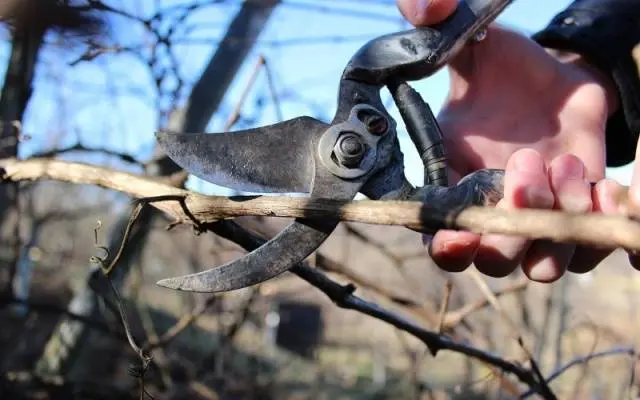
- around the shoot you need to dig a hole about 20 cm deep;
- cut the roots close enough to the trunk with a sharp pruner;
- fall asleep until the green growth of the twigs;
- after the next pruning, you need to leave a hole 10 cm deep.
Trimming
During a three-year period, the care of Marquette grapes consists in timely top dressing and watering. However, further you need to deal with pruning and shaping Marquette grape bushes. In time, uncut vine bushes grow very quickly, forming dense thickets. Pruning creates favorable conditions for its development, increases the illumination of the bunches and their aeration.
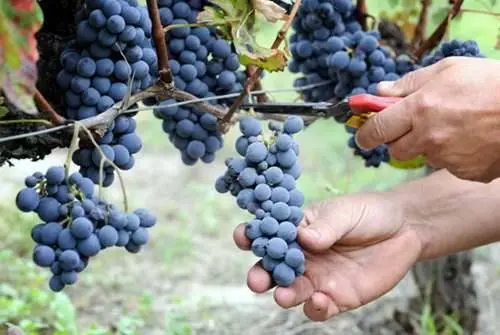
At the beginning of summer, a “dry garter” of grapes is carried out, with the help of which the growth of the vine is directed. Last year’s shoots are tied to the trellis after the end of spring frosts. For the southern regions, the optimal time for the procedure is April, when fresh branches have not yet grown. In the Moscow region, “dry garter of Marquette grapes is carried out in June.
The next operation – a fragment of branches, is carried out with bud break. It consists:
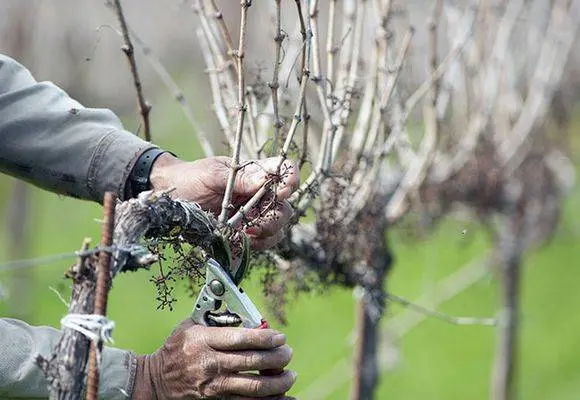
- in pruning barren shoots growing at the base of the vine;
- removal of excess shoots of the Marquette variety appearing from one eye;
- breaking off weak and difficult-growing branches.
Around the end of June, you need to pinch the shoots. In order to provide more nutrition to the grape bunches, the sprouts on the fruit-bearing vine must be shortened by cutting off their tops. Pruning of Marquette bushes should be done, leaving 5 leaves after the second brush. At the same time, you need to pinch the top of the vine so that it does not stretch too much. You should not remove all barren shoots of grapes, as they form a supply of food.
Pinch shoots
All the following operations for the Marquette grape variety are performed only for adult bushes that have reached 3 years of age or more:
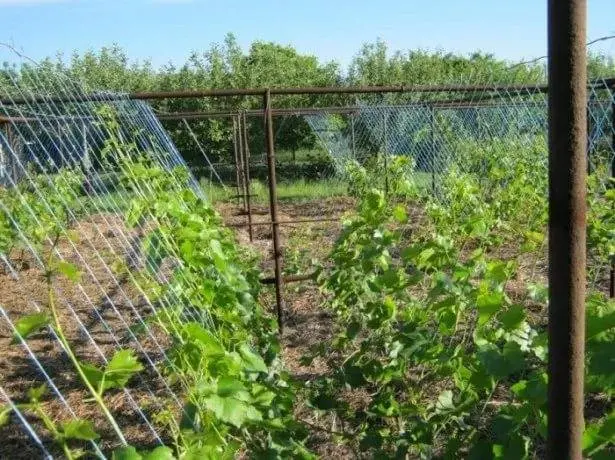
- The “Green Garter” is carried out several times per season, as the shoots grow to the next string on the trellis;
- normalization of grape inflorescences will also provide fruits with a supply of water and trace elements, strengthen their protective properties;
- in August, branches are minted, that is, their tops are cut off after the fifteenth sheet, after which the growth process slows down, and the brushes mature faster.
Twenty days before harvesting the Marquette variety, a leaf thinning procedure is performed. Its essence is to remove old leaves from the bottom of the bushes. The leaves also break off, shading the ripening brushes with berries. Thinning the Marquette vines will provide the bunches with better light and aeration.
In August, growers normalize the harvest by cutting out small berries. Two clusters are left on the branches, the largest, since in the northern regions the climatic conditions do not allow the entire grape harvest to fully ripen.
Watering and feeding
Marquette grapes do not require too frequent watering, but it is especially necessary during bud break, before flowering, after leaf fall. Simultaneously with irrigation, it is possible to fertilize Marquette grapes with phosphorus and nitrogen fertilizers. It is important to regularly loosen the trunk circles, preventing the formation of a thick crust, especially after watering or rains.
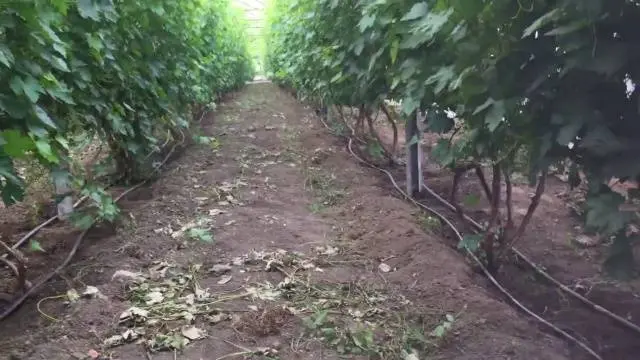
When organizing the feeding of the vine, it must be remembered that its roots can only absorb liquid fertilizer. Therefore, all complex fertilizers must be water-soluble. Nutrition for Marquette grapes is especially necessary during the periods of formation of ovaries and ripening. This process can be accelerated by treating grape bushes with infusion of ash or solutions of potassium-phosphorus salts.
Diseases and pests
Despite the resistance of the Marquette variety to fungal diseases, it is necessary to periodically inspect the grape leaves. Healthy foliage has an even light green color on the underside, without any plaque. If yellowish spots or ash deposits appear on it, the vineyard should be immediately treated with antifungal drugs. All diseased shoots and leaves must be removed and burned immediately.
The best way to fight disease is prevention. Reviews of Marquette grapes are advised at the very beginning of the growing season to treat the bushes with a solution of copper sulfate. Often growers use proven folk remedies. Fruiting bushes of the Marquette variety can be sprayed with a solution of baking soda or potassium permanganate. Regular processing of grapes with infusion of hay dust is useful. You need to insist it only with rainwater.

Variety of wines
Variety Marquette was bred by gradually crossing 8 different species, thanks to which it has a richness of flavors. It produces excellent table wine of different categories:
- semi-sweet drinks;
- dessert wines;
- fortified wines.
Since Marquette grapes are sugary, they must be mixed with less sweet varieties. In a ratio of 1:4, the required indicator for the wort is achieved. Experienced winemakers know that it is important to stop fermentation in time to avoid bitterness in the drink. A bitter taste can also appear if the berry pressure technology is violated.

Subject to all the rules, excellent wine from the Marquette variety can be obtained in the conditions of the North. The climatic conditions of the Moscow region are especially favorable for growing Marquette grapes, as evidenced by numerous reviews. The berries contain a lower percentage of sugar – 24%, due to which the wine is obtained without a bitter aftertaste.
Reviews of growers
Positive assessments of summer residents and winegrowers confirm the merits of Marquette grapes.
Conclusion
The high technical characteristics of the Marquette grape give grounds to many experts to talk about its excellent prospects as a leading variety for the northern regions.









